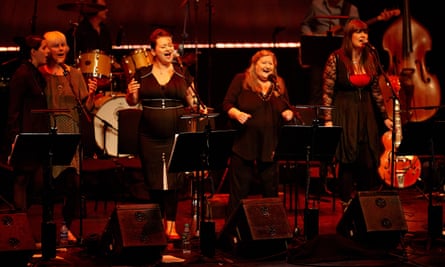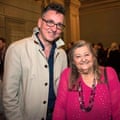If you talk about the greatest singers of all time and miss out Norma Waterson, it’s like talking about guitars and missing out Jimi Hendrix. Her voice was a wondrous thing. She was also one of the loveliest people, all warmth, curiosity and kindness.
When I met her in late 2008, the experience hit me like a bullet train. I was making a Radio 4 series, The Ocean, which involved this mad road trip around the country interviewing folk musicians. Suddenly I was this tiny fly on the wall of the lives of this wonderful family who just happened to be one of English folk’s greatest singing groups, with Norma, the big sister, although she was quite little, in the middle. She had the Brown Betty teapot out and homemade scones and was straight away telling me that she’d seen me and Shirley Bassey on TV the night before and she liked it, to get me comfortable. Later she was wagging her finger at me for going outside and having ciggies. I was meant to be there for an hour but left after dark. I ended up sitting on the floor listening to her stories.
Norma sang the folk song The Bay of Biscay a cappella, in her living room, and her voice got to me like an emotional nailbomb. There were such nuances in its power. Later in our friendship she even encouraged me to sing in front of her, which was terrifying, but she was so kind and encouraging. The greatest compliment I’ve ever received from Norma is her calling me a folk singer. To her, folk music was about singing about where you’re from and what you know. There was no snobbery with her – if it was a good song, it was a good song for Norma.
In 2013 I was honoured to be asked along as a singer on the tour of Bright Phoebus [the live revival of Norma’s siblings Lal and Mike Waterson’s critically acclaimed 1972 album]. We travelled all together in a Transit van – Norma, her husband, Martin [Carthy], and the others – with a table in the back, and Norma would be singing all the way. Nothing was off-limits for her – she’d sing the Beatles, Shakira, American R&B, and even whatever was at the top of the charts. She was like a walking jukebox. She was also very funny, with proper northern humour. Once, when I was talking to her about Lal’s songwriting, which could be very psychedelic, I said: “Norma, I don’t mean to be rude, but did Lal ever take drugs?” She sat there thoughtfully for a moment, then said, straight-faced: “No, but she did eat a lot of pickled onions.”

And God, she was fearless. In the last 10 years of her life she got very ill – she had to learn to walk again – but she kept going and going and wouldn’t give in. You get modern pop stars cancelling tours because they’ve broken a nail. Not her. But as her parents died when she was very young, when all the Waterson children were still kids [they were brought up by their grandmother], that upbringing, that resilience, never left her, I think. I noticed she was especially kind to young people, very aware of their fragility, and I always wondered if that was because she’d had it hard when she was a girl.
But she was also so adventurous. I mean, she left Britain in 1968, when the Watersons were at the height of their fame, to go and be a DJ in the Caribbean [Waterson worked for four years at Radio Antilles in Montserrat]. Isn’t that amazing? She just wanted to immerse herself in the music out there and enjoy the sunshine. Doing something like that on her own didn’t faze her at all. She still had that spirit in her to the end, when I’d call her for chats often. She was still so very curious about the world.
I can’t believe she’s gone. I still play The Bay of Biscay to myself in quiet moments, and am hit every time by how she compels me to listen. All these stunning cadences would emerge from this tiny package of a person. My abiding memory of her will always be when she got so lost in a song, she raised her arms to the skies. When people are wondering what to put on the fourth plinth in Trafalgar Square, I always think they should put a statue of Norma like that and keep it there permanently. What an incredible inspiration, and human being, she was.

